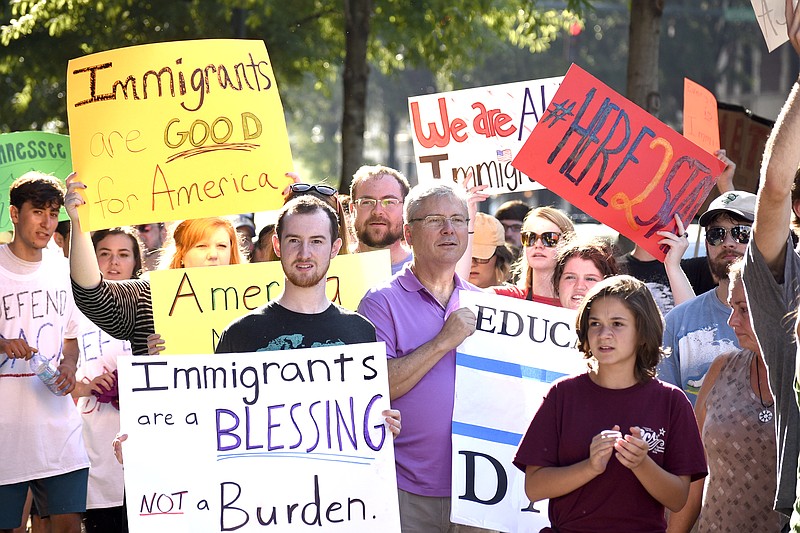It is heartening that Tennessee - and Chattanooga - will continue to welcome refugees in the coming year - even after President Trump in September slashed the number of refugees allowed into the country and gave states and local governments the right to refuse refugee resettlement within their borders.
Gov. Bill Lee, who campaigned on his Christian beliefs, on Dec. 18 said the Volunteer State would reject the president's offer. In deciding the issue, Lee said he considered his own experience helping refugees and weighed it against the will of fellow Republicans in the Legislature. The GOP supermajority in the General Assembly in 2016 ordered a lawsuit against the federal government over its refugee resettlement program, and conservative legislative leaders had hoped Lee would accept Trump's offer.
But Lee stayed the course of his convictions.
"The United States and Tennessee have always been ... a shining beacon of freedom and opportunity for the persecuted and oppressed, particularly those suffering religious persecution," Lee said in a statement. "My administration has worked extensively to determine the best outcome for Tennessee, and I will consent to working with President Trump and his administration to responsibly resettle refugees."
Later he told reporters: "I certainly know there's disagreement on this subject, but there's disagreement around most subjects. You agree to disagree and move forward. But I think it's the right decision and we're moving forward on it."
Chattanooga mayor Andy Berke, Nashville Mayor John Cooper, Knoxville Mayor Madeline Rogero and Shelby County Mayor Lee Harris did likewise.
But with a Jan. 21 deadline looming, Lee's early decision was noteworthy given how few Republican governors have been open to accepting refugees. More than 30 governors recently had agreed to accept refugees, but about a dozen Republican governors remained silent, including Georgia's Gov. Brian Kemp, according to The Associated Press.
In the Tennessee General Assembly, opposition already has begun. One of the state's most conservative lawmakers, Rep. Bruce Griffey, R-Paris, has filed a bill requiring Tennessee to halt any refugee resettlement.
House Speaker Cameron Sexton, R-Crossville, said Griffey's bill may gain traction, but not all Republicans share that view. Sen. Steve Dickerson, R-Nashville, told the Nashville Tennessean he praised Lee's action.
"I applaud Gov. Lee for making this decision as I have long believed that a diverse and welcoming Tennessee makes us a stronger Tennessee," Dickerson said.
Other political observers think little can effectively be done to undercut the governor, given that the authority to make the decision was granted by the president.
Political bickering aside, Tennessee has welcomed refugees - a vetted group of people who fear persecution in their home countries - for decades. In 2019, 692 refugees resettled in the Volunteer State, according to the Tennessean. That was up from 2018's 478, but down from a high of 2,049 in 2016.
Most if not all of those refugees arrived here through Catholic Charities of Tennessee, Inc. - the umbrella agency for partners like Bridge Refugee Services in Chattanooga. The groups' resettlement work began in 1962 with the finding of foster homes for 43 Cuban refugee children. By 1995, more than 10,000 refugees of many faiths and more than 35 countries had received help through Catholic Charities of Tennessee.
Frankly, it's not very different from how the vast majority of Americans - or at least their parents or grandparents - got here. We are a nation of immigrants. Tennessee's first governor, John Sevier, was the oldest son of an immigrant from England. And in announcing that Chattanooga would continue to accept refugees, Mayor Berke talked about his grandfather's journey to resettle from the Baltic region of Europe in 1915.
"They were the victims of persecution in Lithuania. It took them many years of walking and trying to get to America," he recently told WRCB TV. "My grandfather went to (Chattanooga) City High School, learned how to speak English, was part of the community, ended up going to college, and becoming part of the Chattanooga culture. And that's the American dream."
What's more, Chattanooga's foreign-born population - not just refugees, but all foreign-born - jumped by more than 68% from 7,573 in 2013 to 12,786 in 2017, according to new analysis of census data by Point2Homes, an online real estate marketing firm. That still is only about half of the national rate and less than one-fourth the rate in nearby Dalton, but the percentage growth in foreign-born residents was faster in Chattanooga than any other major U.S. city.
Part of this diversity growth is due to the Chattanooga area's ability to recruit business and talent from around the world - Volkswagen, Wacker Chemie, BASF, Gestamp, Sanofi, Komatsu, Yanfeng, Denso Manufacturing and Nippon Paint.
"We've seen consistent growth in foreign direct investment over the past decade, with an influx of more than $7 billion from around the globe - Germany, France, Spain, Belgium, China, India, Norway and other countries," said Charles Wood, vice president of economic development at the Chattanooga Chamber of Commerce. "By choosing Chattanooga, these companies draw more diversity to our region in addition to jobs that benefit our entire community."
Tennessee will continue to benefit from Lee's good heart and his just decision to accept needy and grateful refugees.
